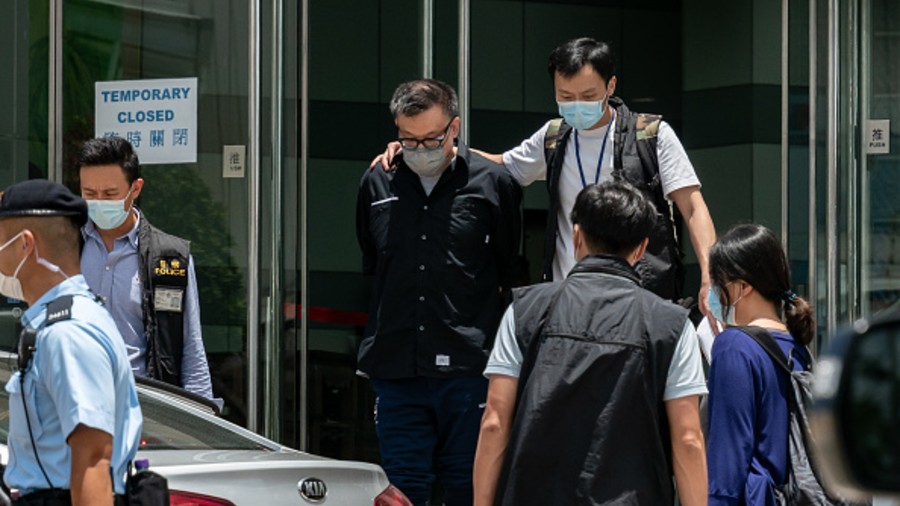Journalists at Apple Daily, a feisty Hong Kong newspaper, had been bracing for some kind of a crackdown. The splashy Chinese-language tabloid — which mixes celebrity gossip, investigations of the powerful and pro-democracy editorials — has increasingly been under the scrutiny of the authorities since the arrest last August of owner Jimmy Lai, who remains in jail for joining unauthorised rallies.
Still, Thursday’s early-morning raid by 500 police officers was a shock, not only to Apple Daily staffers but to journalists throughout China’s freest city and, more broadly, people concerned about eroding press freedom in the former British colony.
Officers sealed off the block around the building housing the Apple Daily newsroom and printing press, emptied the newsroom and rifled through computers and desks. They arrested five executives, including the two top editors, on suspicion of “colluding with foreign forces”.
Scores of police milled about and swept the emptied newsroom for half a day, live feeds from expelled staff showed from outside.
The raid, seizure of journalistic material and arrests of senior journalists, for alleged violations of a year-old security law imposed by Beijing, is being widely seen as the most direct attack on Hong Kong’s freewheeling media since Beijing regained control of the city in 1997.
Now staffers fear the 26-year-old paper could be closed, said two senior editors and Mark Simon, Lai’s right-hand man, who has fled abroad.
Persistent rumours that the authorities would try to “shut down” Apple before July 1, when Chinese President Xi Jinping leads celebrations for the Communist Party’s centenary, seem more likely now, Simon told Reuters.
“I’m starting to think that,” he said by phone from the US.
The newsroom began bracing for a crackdown after Hong Kong’s police chief warned in April that media outlets that endanger national security through “fake news” would be investigated, said four Apple Daily reporters, ranging from junior to senior.
Morale suffered, and a handful of staffers quit.
Town hall meetings were held to reassure staff and contingency plans laid. Most staff received cards with lawyer contacts and assurances the company would back everyone legally. News materials were firewalled or sent abroad to protect information and sources.
On the business side, with the company struggling financially and facing uncertainties over its building lease, non-core media businesses such as a charity fund run by Lai were moved to separate offices, Simon and another senior staffer said.
Apple Daily’s advocacy of democratic rights and freedoms has made it a thorn in Beijing’s side since Lai, a self-made textiles tycoon known for a hip clothing chain, started it in 1995.
It shook up the region’s Chinese-language media landscape and became a democratic icon on the margins of Communist China.
Hong Kong’s security chief, John Lee, said those arrested were part of a “conspiracy” to make use of “journalistic work” to bring western sanctions on Hong Kong. He added authorities respected media freedoms but skirted a question on whether Apple would be shut down.
However, some Hong Kong insiders predict more moves.
“In China’s mind, anything could endanger national interests, so they tighten everything,” said a government official who deals with media issues. “And until everything is settled, they won’t relax the process.”
Last year’s security law was Beijing’s first major move to put Hong Kong on an authoritarian path.
It punishes anything Beijing deems as subversion, secessionism, terrorism and collusion with foreign forces with up to life in prison.










